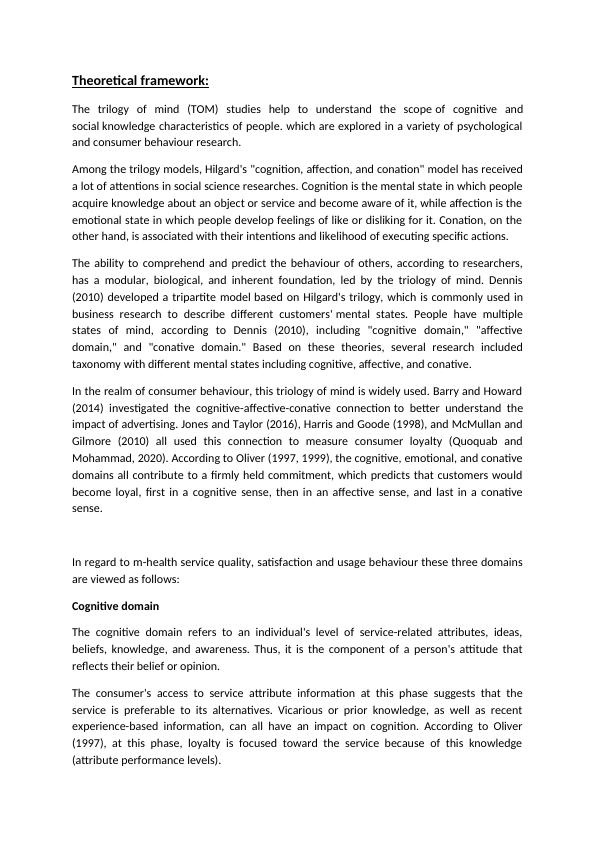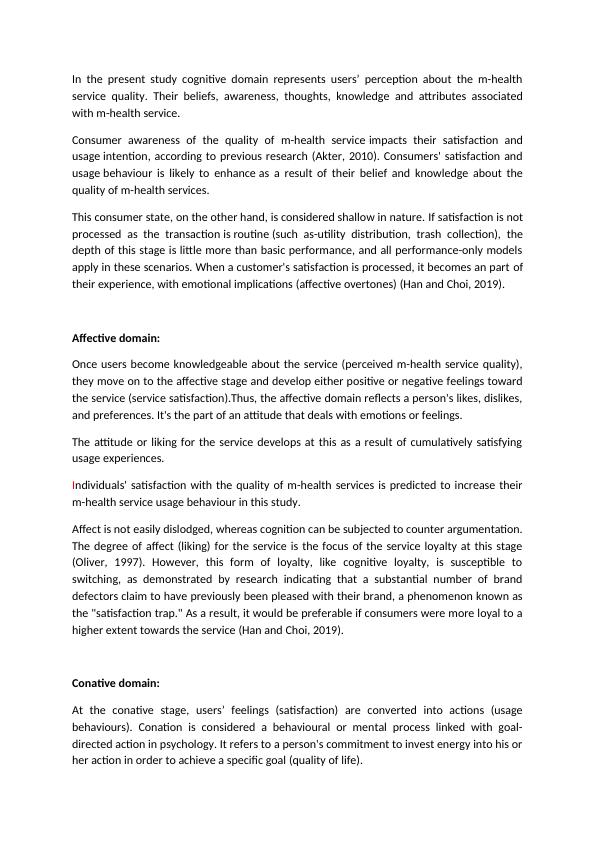scope of cognitive and social knowledge PDF
Added on 2021-11-17
4 Pages1148 Words139 Views
Theoretical framework:
The trilogy of mind (TOM) studies help to understand the scope of cognitive and
social knowledge characteristics of people. which are explored in a variety of psychological
and consumer behaviour research.
Among the trilogy models, Hilgard's "cognition, affection, and conation" model has received
a lot of attentions in social science researches. Cognition is the mental state in which people
acquire knowledge about an object or service and become aware of it, while affection is the
emotional state in which people develop feelings of like or disliking for it. Conation, on the
other hand, is associated with their intentions and likelihood of executing specific actions.
The ability to comprehend and predict the behaviour of others, according to researchers,
has a modular, biological, and inherent foundation, led by the triology of mind. Dennis
(2010) developed a tripartite model based on Hilgard's trilogy, which is commonly used in
business research to describe different customers' mental states. People have multiple
states of mind, according to Dennis (2010), including "cognitive domain," "affective
domain," and "conative domain." Based on these theories, several research included
taxonomy with different mental states including cognitive, affective, and conative.
In the realm of consumer behaviour, this triology of mind is widely used. Barry and Howard
(2014) investigated the cognitive-affective-conative connection to better understand the
impact of advertising. Jones and Taylor (2016), Harris and Goode (1998), and McMullan and
Gilmore (2010) all used this connection to measure consumer loyalty (Quoquab and
Mohammad, 2020). According to Oliver (1997, 1999), the cognitive, emotional, and conative
domains all contribute to a firmly held commitment, which predicts that customers would
become loyal, first in a cognitive sense, then in an affective sense, and last in a conative
sense.
In regard to m-health service quality, satisfaction and usage behaviour these three domains
are viewed as follows:
Cognitive domain
The cognitive domain refers to an individual's level of service-related attributes, ideas,
beliefs, knowledge, and awareness. Thus, it is the component of a person's attitude that
reflects their belief or opinion.
The consumer's access to service attribute information at this phase suggests that the
service is preferable to its alternatives. Vicarious or prior knowledge, as well as recent
experience-based information, can all have an impact on cognition. According to Oliver
(1997), at this phase, loyalty is focused toward the service because of this knowledge
(attribute performance levels).
The trilogy of mind (TOM) studies help to understand the scope of cognitive and
social knowledge characteristics of people. which are explored in a variety of psychological
and consumer behaviour research.
Among the trilogy models, Hilgard's "cognition, affection, and conation" model has received
a lot of attentions in social science researches. Cognition is the mental state in which people
acquire knowledge about an object or service and become aware of it, while affection is the
emotional state in which people develop feelings of like or disliking for it. Conation, on the
other hand, is associated with their intentions and likelihood of executing specific actions.
The ability to comprehend and predict the behaviour of others, according to researchers,
has a modular, biological, and inherent foundation, led by the triology of mind. Dennis
(2010) developed a tripartite model based on Hilgard's trilogy, which is commonly used in
business research to describe different customers' mental states. People have multiple
states of mind, according to Dennis (2010), including "cognitive domain," "affective
domain," and "conative domain." Based on these theories, several research included
taxonomy with different mental states including cognitive, affective, and conative.
In the realm of consumer behaviour, this triology of mind is widely used. Barry and Howard
(2014) investigated the cognitive-affective-conative connection to better understand the
impact of advertising. Jones and Taylor (2016), Harris and Goode (1998), and McMullan and
Gilmore (2010) all used this connection to measure consumer loyalty (Quoquab and
Mohammad, 2020). According to Oliver (1997, 1999), the cognitive, emotional, and conative
domains all contribute to a firmly held commitment, which predicts that customers would
become loyal, first in a cognitive sense, then in an affective sense, and last in a conative
sense.
In regard to m-health service quality, satisfaction and usage behaviour these three domains
are viewed as follows:
Cognitive domain
The cognitive domain refers to an individual's level of service-related attributes, ideas,
beliefs, knowledge, and awareness. Thus, it is the component of a person's attitude that
reflects their belief or opinion.
The consumer's access to service attribute information at this phase suggests that the
service is preferable to its alternatives. Vicarious or prior knowledge, as well as recent
experience-based information, can all have an impact on cognition. According to Oliver
(1997), at this phase, loyalty is focused toward the service because of this knowledge
(attribute performance levels).

In the present study cognitive domain represents users’ perception about the m-health
service quality. Their beliefs, awareness, thoughts, knowledge and attributes associated
with m-health service.
Consumer awareness of the quality of m-health service impacts their satisfaction and
usage intention, according to previous research (Akter, 2010). Consumers' satisfaction and
usage behaviour is likely to enhance as a result of their belief and knowledge about the
quality of m-health services.
This consumer state, on the other hand, is considered shallow in nature. If satisfaction is not
processed as the transaction is routine (such as-utility distribution, trash collection), the
depth of this stage is little more than basic performance, and all performance-only models
apply in these scenarios. When a customer's satisfaction is processed, it becomes an part of
their experience, with emotional implications (affective overtones) (Han and Choi, 2019).
Affective domain:
Once users become knowledgeable about the service (perceived m-health service quality),
they move on to the affective stage and develop either positive or negative feelings toward
the service (service satisfaction).Thus, the affective domain reflects a person's likes, dislikes,
and preferences. It's the part of an attitude that deals with emotions or feelings.
The attitude or liking for the service develops at this as a result of cumulatively satisfying
usage experiences.
Individuals' satisfaction with the quality of m-health services is predicted to increase their
m-health service usage behaviour in this study.
Affect is not easily dislodged, whereas cognition can be subjected to counter argumentation.
The degree of affect (liking) for the service is the focus of the service loyalty at this stage
(Oliver, 1997). However, this form of loyalty, like cognitive loyalty, is susceptible to
switching, as demonstrated by research indicating that a substantial number of brand
defectors claim to have previously been pleased with their brand, a phenomenon known as
the "satisfaction trap." As a result, it would be preferable if consumers were more loyal to a
higher extent towards the service (Han and Choi, 2019).
Conative domain:
At the conative stage, users’ feelings (satisfaction) are converted into actions (usage
behaviours). Conation is considered a behavioural or mental process linked with goal-
directed action in psychology. It refers to a person's commitment to invest energy into his or
her action in order to achieve a specific goal (quality of life).
service quality. Their beliefs, awareness, thoughts, knowledge and attributes associated
with m-health service.
Consumer awareness of the quality of m-health service impacts their satisfaction and
usage intention, according to previous research (Akter, 2010). Consumers' satisfaction and
usage behaviour is likely to enhance as a result of their belief and knowledge about the
quality of m-health services.
This consumer state, on the other hand, is considered shallow in nature. If satisfaction is not
processed as the transaction is routine (such as-utility distribution, trash collection), the
depth of this stage is little more than basic performance, and all performance-only models
apply in these scenarios. When a customer's satisfaction is processed, it becomes an part of
their experience, with emotional implications (affective overtones) (Han and Choi, 2019).
Affective domain:
Once users become knowledgeable about the service (perceived m-health service quality),
they move on to the affective stage and develop either positive or negative feelings toward
the service (service satisfaction).Thus, the affective domain reflects a person's likes, dislikes,
and preferences. It's the part of an attitude that deals with emotions or feelings.
The attitude or liking for the service develops at this as a result of cumulatively satisfying
usage experiences.
Individuals' satisfaction with the quality of m-health services is predicted to increase their
m-health service usage behaviour in this study.
Affect is not easily dislodged, whereas cognition can be subjected to counter argumentation.
The degree of affect (liking) for the service is the focus of the service loyalty at this stage
(Oliver, 1997). However, this form of loyalty, like cognitive loyalty, is susceptible to
switching, as demonstrated by research indicating that a substantial number of brand
defectors claim to have previously been pleased with their brand, a phenomenon known as
the "satisfaction trap." As a result, it would be preferable if consumers were more loyal to a
higher extent towards the service (Han and Choi, 2019).
Conative domain:
At the conative stage, users’ feelings (satisfaction) are converted into actions (usage
behaviours). Conation is considered a behavioural or mental process linked with goal-
directed action in psychology. It refers to a person's commitment to invest energy into his or
her action in order to achieve a specific goal (quality of life).

End of preview
Want to access all the pages? Upload your documents or become a member.
Related Documents
Consumer behaviour - Assignment PDFlg...
|6
|2512
|357
Impact of Constraints on Consumer Participation in Mental Health Care Serviceslg...
|14
|4155
|275
